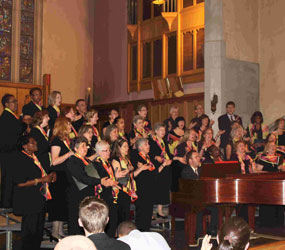Like Duke Orsino in Shakespeare’s “Twelfth Night,” Mercy Medical Center’s Dr. Kathy J. Helzlsouer may be inclined to agree that, “if music be the food of love, play on.”
While the director of Mercy’s Prevention and Research Center continues to try to find better medical and organizational ways to help cancer survivors cope with the many challenges they face – from stress and persistent fatigue to pain and psychological issues – she has become a serious proponent of the healing power of music.
“Music is one of the things that really helps us cope,” said Helzlsouer, who modestly admits that she has a “not too bad” singing voice.
In fact, the good doctor put her mouth where her conviction is by joining Mercy’s Healing Power of Music Chorus, made up of Mercy care providers, patients, and parents and friends of the Maryland State Boychoir, which was the main feature in a benefit concert presented May 1 at the MSB Center for the Arts.
“It was a really powerful experience,” Helzlsouer said, “allowing all of us, especially the cancer survivors, to help our minds focus on something else. The worries of the day disappear. It was joyful, inspirational, emotional, and just mind boggling.”
She believes that for many people, not only cancer patients and survivors, music can help connect them to their emotions and can often provide a way to be better socially connected.
In fact, music therapy has become a key therapeutic tool used within most integrative medicine programs at many cancer centers around the nation.
One recent published study found that two hours of music therapy helped cancer survivors relax significantly while making them feel far less fatigued; fatigue being one of the most common and debilitating post-cancer treatment symptoms.
Music’s healing potential is important enough to Helzlsouer for her to have made sure that the subject be an integral part of a special Mercy-sponsored cancer survivorship forum to be held June 4 at the Hyatt Regency in Baltimore’s Inner Harbor.
Along with such important challenge topics as “Balancing and Managing Work and Life after Cancer,” the program will feature “Mindfulness-based Stress Reduction and Music Therapy.”
Helzlsouer said she often brings up the healing potential of music when talking with cancer survivor patients. She recalled how one of her patients who suffered from fatigue decided to give it a try.
“She put music on and danced around in the kitchen while fixing dinner. She loved it; she felt better and she got motion and exercise in the process,” Helzlsouer said.
“There’s just a lot of evidence these days that music therapy really works and that it’s now incorporated into many health care settings,” Helzlsouer said. “It’s not a cure-all, of course, but it’s a valuable adjunct to medical and rehabilitative care.”
The May 1 concert was Helzlsouer’s chorus debut, and now she is looking forward to singing again at the June 4 cancer survivorship forum, which is being held in recognition of National Cancer Survivors Day.
“My hope is that we can keep this up,” Helzlsouer said, “that we can keep the chorus together and reach as many people as we can.” She said at least several of the chorus members are planning to continue singing.
The award-winning cancer researcher, who serves as chairwoman of Maryland’s Cancer Control Council, said she is “not good enough to sing a solo,” but plans to be an active member of the chorus.
“Music is intertwined in our being and it’s something we can all enjoy and truly benefit from,” she said.


